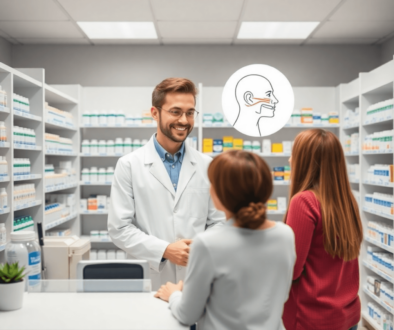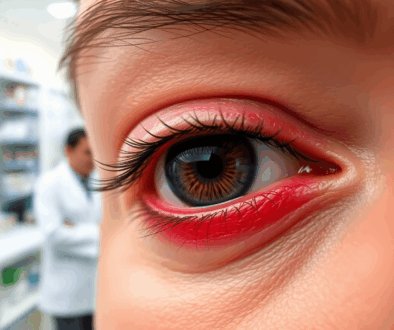What Is a Minor Ailment and When Should You See a Pharmacist?
Understanding Minor Ailments and the Role of Pharmacists
Let’s start with the basics: What is a minor ailment? Think of it as that annoying but manageable health hiccup that doesn’t need a full-blown doctor’s visit. These conditions are usually self-limiting—meaning they tend to get better on their own—or straightforward enough to handle without complex lab tests or treatments. Examples include:
- Allergies like hay fever
- GERD
- Cold Sores
- Heartburn
- Menstrual cramps
- Uncomplicated urinary tract infections
Knowing when to tap into your pharmacist’s expertise can save you time, hassle, and sometimes even money. Pharmacists are healthcare pros trained to assess these common problems, provide advice, recommend over-the-counter or prescription treatments (where allowed), and help manage your symptoms effectively.
Why consult a pharmacist instead of heading straight to your doctor? Pharmacists offer quick access often without appointments, ideal for those “I just need something now” moments. Plus, they can flag when a minor issue is actually a bigger problem requiring medical attention.
Understanding the pharmacist’s role in minor health issues empowers you to make smart choices about your care—and keeps the healthcare system running smoother. Their expertise is not just beneficial for adults but also plays a crucial role in safely managing children’s medications and dosages, showcasing their versatility in the healthcare team which needs a pharmacist for optimal patient care.
Common Minor Ailments You Can Manage at Home
Minor ailments are self-limiting conditions or uncomplicated health problems. These are issues your body can often handle on its own, or with a little help from over-the-counter remedies and some practical advice from your friendly neighbourhood pharmacist. They’re the kind of things that don’t usually snowball into emergencies and don’t typically require a doctor’s immediate attention.
Here’s a quick rundown of common minor ailments you can confidently tackle at home:
Skin and Allergies
- Acne: Those pesky pimples? Usually caused by clogged pores, acne is a classic self-limiting condition. Mild to moderate cases respond well to topical treatments available at pharmacies.
- Allergies: Sneezing, itchy eyes, and runny noses from allergic rhinitis or seasonal allergies can be managed with antihistamines and nasal sprays without a doctor’s visit. For more tailored advice, check out this guide on how to choose the right allergy treatment for your needs.
Digestive Issues and Menstrual Cramps
- Heartburn (Acid Reflux): Occasional burning sensation after meals? Antacids or lifestyle tweaks usually do the trick. However, for those looking for more long-term solutions, here’s an ultimate guide to beating heartburn naturally that could provide valuable insights.
- Menstrual Cramps: Over-the-counter painkillers and heat pads are your best allies when Aunt Flo visits.
Urinary Tract Infections
- Uncomplicated Urinary Tract Infections (UTIs): If symptoms are mild, pharmacists can recommend appropriate treatment options and advise if you need to see a doctor.
These conditions share something crucial: they’re typically straightforward to identify and manage without extensive medical testing. That means no need for long waits in a clinic or ER unless symptoms worsen or persist beyond what’s typical. Your pharmacist is perfectly positioned to guide you through symptom relief strategies, recommend suitable products, and flag when it’s time for a deeper dive with another healthcare professional.
Additionally, if you’re interested in understanding more about specific family medicine conditions and treatments, the UF Health website offers an extensive range of information that could be beneficial.
How Pharmacists Can Help You with Your Minor Ailments
Pharmacists are the unsung heroes of the healthcare world, ready to tackle your minor ailments head-on. Here’s how these white-coated wizards can wave their magic wand and make your troubles disappear:
1. Assessment
Pharmacists are like Sherlock Holmes, but for your health. They can assess your symptoms, delve into your medical history, and piece together the puzzle of your minor ailment.
2. Advice
Need some guidance on how to kick that pesky headache to the curb? Pharmacists are armed with knowledge bombs to help you manage your symptoms effectively.
3. Treatment Recommendations
From recommending the perfect cream for that skin rash to suggesting the ideal medication for your allergies, pharmacists have got your back.
4. Prescribing Authority
In regions like British Columbia pharmacists have leveled up their game. They’re not just handing out pills; they’re authorized to write prescriptions for certain conditions. It’s like having a mini-doctor right in the pharmacy!
5. Disease Prevention and Treatment Guidance
Furthermore, if you’re a parent seeking advice on measles prevention and treatment, pharmacists can provide valuable information based on their extensive knowledge and training.
In addition to these roles, pharmacists also play a crucial part in promoting healthcare accessibility and ensuring patient safety through proper medication management as highlighted by this research.
Pharmacists aren’t just there to count pills; they’re your partners in health. With expanded roles in prescribing medications, they bring convenience and expertise right to your doorstep.
So next time you’re battling a minor ailment, remember: your friendly neighborhood pharmacist is just a consultation away from putting you back on the road to wellness.
When Should You See a Pharmacist for Your Minor Ailment?
Timing for pharmacist consultation on minor ailments is key. Think of your pharmacist as the go-to person when you need quick, reliable advice or treatment without the hassle of booking a doctor’s appointment. If you’re dealing with a minor ailment that’s causing discomfort but isn’t life-threatening or worsening rapidly, it’s prime time to visit your pharmacist.
Situations perfect for popping into a pharmacy:
- You want fast relief: Headaches, heartburn, or that annoying athlete’s foot flare-up don’t usually require a full medical workup.
- You need expert advice on over-the-counter (OTC) products: Not sure which cold remedy suits your symptoms? Pharmacists help you navigate aisles packed with confusing choices.
- You seek medication reviews: Already taking meds? Pharmacists can check for interactions and ensure everything plays nicely together.
- You want guidance on symptom management: They offer practical tips to ease discomfort and prevent recurrence.
Pharmacists excel at managing minor ailments with a personalized approach. They review your medical history and current medications to recommend the safest, most effective treatment options. That means fewer unnecessary doctor visits, faster solutions, and smarter use of healthcare resources.
Knowing what is a minor ailment and when should you see a pharmacist empowers you to make informed decisions about your health—without waiting in long clinic lines or stressing over what comes next.
If you’re considering transferring prescriptions to an online pharmacy, knowing what to expect during this process can help alleviate any concerns.
Lastly, if you’re thinking about switching pharmacies, it’s important to know how to do so without interrupting your medication schedule.
What Happens During a Pharmacist Consultation for Your Minor Ailment?
When you step into a pharmacy seeking help, the process during pharmacy assessment for minor ailments kicks off with a private consultation. This is not just behind-the-counter chatter—pharmacists use a confidential space to discuss your symptoms openly and without distractions.
Here’s what typically happens:
- Symptom Assessment: The pharmacist asks targeted questions about your ailment, its duration, severity, and any other health conditions or medications you’re on.
- Medical History Review: They check for allergies or possible drug interactions that could influence treatment choices.
- Treatment Discussion: Based on the information gathered, they recommend over-the-counter remedies, lifestyle advice, or if authorized, prescribe medication.
- Follow-Up Plan: Sometimes they may set up a follow-up to monitor progress or adjust treatment if needed.
Possible outcomes from your visit include:
- Receiving a prescription within the pharmacist’s scope of practice (like topical creams for athlete’s foot or antihistamines for allergies).
- Getting advice on managing symptoms with non-prescription products.
- Referral to a doctor or specialist if your condition requires more in-depth evaluation or is outside the minor ailment range.
This streamlined approach saves time and ensures you get tailored care right when you need it—without waiting for an appointment. However, if you do receive a prescription that needs to be filled, there are options available for how you can receive your medication. For instance, you might wonder should you choose a courier or mail service for prescription delivery? Each option has its pros and cons in terms of speed, safety, and convenience.
Moreover, with advancements in healthcare logistics, same-day prescription delivery is becoming more common in places like Toronto. This service significantly improves medication access and patient convenience.
If you’re considering online options for managing your prescriptions, it’s essential to understand common misconceptions about online prescription safety. Being informed can help ensure safer medication use.
Finally, if you’re unsure about how to handle prescription refills or renewals online, there are resources available that address frequently asked questions about this process.
Benefits of Using Pharmacy Services for Your Minor Ailments
Pharmacies are like your healthcare pit stop—fast, convenient, and surprisingly thorough. The advantages of seeking accessible healthcare through pharmacies are hard to beat:
- No appointment needed: Walk in whenever you need advice or treatment. No waiting weeks for a doctor’s slot. Your pharmacist is ready when you are.
- Speedy service: Minor ailments don’t have to mean major delays. Pharmacists often provide quicker assessments and solutions, letting you get back to your day without fuss.
- Cost savings: Many minor ailment services at pharmacies come free or covered by government health plans depending on where you live. That means less out-of-pocket expense compared to some doctor visits.
- Local expertise: Pharmacies are embedded in communities, making them easy to find and access even during after-hours or weekends.
Think of pharmacies as your neighborhood healthcare multitaskers—handling quick fixes, answering questions, and easing the load on emergency rooms and clinics.
This combination of accessibility, affordability, and expert care makes pharmacists a smart first call for minor health hiccups. It’s like having a healthcare lifeline right around the corner.
Moreover, it’s worth noting that certain pharmacy services can be particularly beneficial for specific demographics, such as seniors. Explore how telepharmacy and innovative services improve medication access and care for seniors, especially in rural areas.
Additionally, while big chain pharmacies have their advantages, [local independent pharmacies offer personalized service, better prices, and community support](https://misterpharmacist.com/uncategorized/top-benefits-of-choosing-a-local-independent-pharmacy-over-big-chains) which can enhance your overall healthcare experience.
Choosing the Right Pharmacy for Your Minor Ailment Needs
When it comes to managing minor health issues, selecting a trusted pharmacy in Toronto is crucial for receiving optimal care. Here’s why you should consider MisterPharmacist as your top choice pharmacy:
Why You Should Consider MisterPharmacist in Toronto
Standing tall as Toronto’s only 5-star Google-rated pharmacy, MisterPharmacist shines with exceptional service quality that sets it apart from the rest.
Benefits of Choosing MisterPharmacist
- Exceptional Service Quality: At MisterPharmacist, excellence isn’t just a goal—it’s a standard. From expert advice to personalized care, every visit guarantees top-notch service.
- Ease of Switching: Transitioning to MisterPharmacist promises a smoother and more satisfying pharmacy experience. Say goodbye to hassle and hello to convenience.
Remember, your health deserves the best. Choose MisterPharmacist for a pharmacy experience that truly cares about you. Whether you need B12 injections or fast prescription delivery, MisterPharmacist is equipped to handle all your needs.
Conclusion
When thinking about What Is a Minor Ailment and When Should You See a Pharmacist?, remember this: your pharmacist is usually the fastest way to feel better. No waiting rooms, no long appointments, just expert advice and treatment for those everyday annoyances.
But don’t forget, it’s not only about physical problems. Pharmacies are also stepping up to provide accessible healthcare, offering support for mental health needs through medication management and early intervention.
Why settle for less when you can have:
- Personalized care from Toronto’s only 5-star Google-rated pharmacy
- Quick, hassle-free consultations without the red tape
- A team that knows your health history and cares about your well-being
Switching your pharmacy to MisterPharmacist isn’t just a change; it’s an upgrade. Your minor ailments deserve major attention.
Drop by or give us a shout to experience the seamless service that busy downtown pros swear by. Because when it comes to health, settling for anything less than stellar is simply not worth it.



